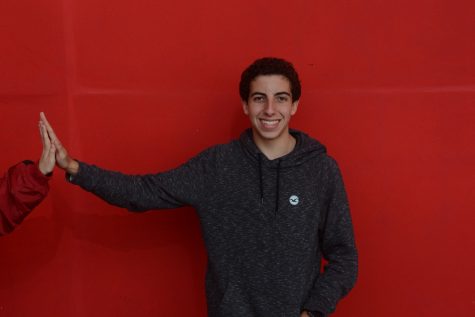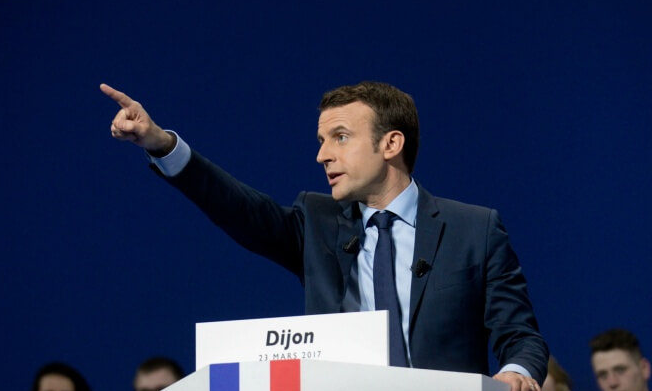Meet Macron
On May 14th, 2017, Emmanuel Jean-Michel Frédéric Macron (born December 21st, 1977) formally became the 8th President of the Fifth French Republic. At 39 years old, Macron is the youngest French head of state since Napoleon Bonaparte.
Macron studied philosophy at Paris Nanterre University, earned a master’s degree in public affairs at Sciences Po and graduated from the École Nationale D’Administration (ENA) in 2004. His career has crossed the gap between the public and private sectors multiple times. Macron was an Inspector of Finances in the Inspectorate General of Finances (IGF) and left that job for an investment banking position at Rothschild & Cie Banque. Macron joined the Socialist Party in 2006 and left the group three years later. In 2012 he was appointed deputy secretary-general of François Hollande’s government. In 2014, he assumed the roles of Minister of Economy, Industry and Digital Affairs under the government of Prime Minister Manuel Valls. He resigned in mid-2016 in hopes of launching a campaign in the 2017 presidential elections.
Macron ran under the banner of the political movement En Marche!. He founded the centrist movement in early 2016. In terms of his political compass, Macron has been presented as a centrist and liberal figure. Macron qualified for the runoff after placing first in the election’s initial round on April 23rd. On May 7th he defeated his largest rival, Marine Le Pen of the National Front, and won the presidency. During the elections, Macron amassed a wide range of supporters. His most notable endorsements include MEP Daniel Cohn-Bendit, ecologist candidate François de Rugy, the Grand Mosque of Paris, Jean-Claude Juncker, Angela Merkel and even former US President Barack Obama.
Some of Macron’s largest challenges in the way of his proposed economic plans are a 10% national unemployment rate, a near 25% unemployment rate for people aged 25 and under, bloated public spending (56% of France’s GDP) and low economic growth in the nation. President Macron’s economic and financial plans are quite extensive, given his career background. His main aims are to boost investment in France and set up a new Nordic-style growth model that will help social mobility and the natural environment. He has promised to reduce corporation tax to 25%, down from ⅓ , pledged to reduce public spending by 60 billion Euros in order to remain in line with the EU’s government deficit limit of 3% of GDP and cut 120,000 public sector jobs. He has promised to toughen the federal government’s stance on certain conditions of unemployment benefits and wants to introduce a greater flexibility on the statutory 35-hour working week and retirement age. During the elections he announced that he would fight to exonerate 80% of households from the “taxe d’habitation“, or property tax.
He also plans to invest 50 billion Euros in green energy, tradesmen training to combat unemployment, public transportation, justice and public sector administration in line with the 60 billion Euro cut in public spending. The remaining 10 billion Euros will go towards a separate fund for renewing the industrial sector.
In terms of immigration policies, President Macron hopes to create an EU border guard force with 5,000 personnel. He wishes to give all religious leaders in France “comprehensive training” in the nation’s secular values and make fluency in French a main qualification for obtaining the nationality. When it comes to asylum seekers, Macron believes that all refugees entitled to protection are welcome and asylum claims must be settled within six months. However, rejected asylum cases will be returned to their countries of origin immediately.
Displayed on his website is the quote: “The duty of Europe is to offer asylum to those who are persecuted and seek its protection. It is also helping to address the causes of migratory movements — underdevelopment, famines, climatic disorders. But the European Union cannot accept on its soil all those who are in search of a better life. In this context, France must take its fair share in the reception of refugees.”
In respect to foreign relations, Macron fully supports institutions and organizations such as the United Nations and its most authoritative body, the Security Council. He supports EU policies regarding the Russian Federation and sanctions placed by international organizations following the Crimean crisis. President Macron believes that Syrian President Bashar al-Assad should answer for his crimes before an international judicial court and wishes to increase spending in African aid to 0.7% of France’s GNI.
Will France’s young, new Head of State stand the test of the Presidency? Only time will tell. For now, the international community must patiently sit by and watch as a new leader takes the country with the world’s fifth largest economy down a new path for the next five years.
Sources: telegraph.co.uk, bbc.co.uk, nytimes.com

Ever since he first “read” a book by himself (or at least phonetically memorized the contents after having it read aloud repeatedly), Alexandre has...








